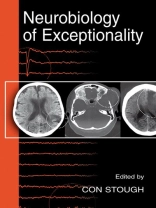Nurture or nature? Biology or environment? Why are some people intelligent, or personable, or creative and others obtuse, or shy, or unimaginative? Although each human being is a unique mixture of positive and negative traits and behaviors, the question remains: What is the neurobiological basis for each individual’s makeup? For example, why does one person suffer from a disorder (e.g., ADHD, autism, mental retardation) and another lives free of maladies?
These are just some of the issues addressed in detail in Neurobiology of Exceptionality. The introductory chapter provides a broad-based overview of current neurobiological techniques (i.e., terms, procedures, and technologies), which are followed by chapters that offer in-depth examination of the neurobiological bases for:
• Impulsive sensation seeking
• Creativity
• Intelligence
• Antisociality
• Autism, mental retardation, and Down Syndrome
• ADHD
• Savant Syndrome
This volume provides a one-stop source for clinical psychologists and other allied mental health professionals to access information on a wide range of research on the neurobiology of psychological and psychiatric traits. It is designed to give readers an overview of the current knowledge base of the biological processes for each trait. It is unlikely that any one book could cover all human traits, but the Neurobiology of Exceptionality addresses a wide range of exceptional psychological traits and psychiatric disorders.
Jadual kandungan
An Overview of Neurobiological Methods.- Neurobiological Techniques: Overview of Terms, Procedures, and Technologies.- Neurobiology of Psychological Traits.- The Neurobiology of Impulsive Sensation Seeking: Genetics, Brain Physiology, Biochemistry, and Neurology.- Neurobiology of Creativity.- Neurobiology of Intelligence.- Neurobiology of Abnormal Traits.- Neurobiology of Antisociality.- Neurobiology of Autism, Mental Retardation, and Down Syndrome: What Can We Learn about Intelligence?.- Neurobiology of ADHD.- Neurobiology of Savant Syndrome.












